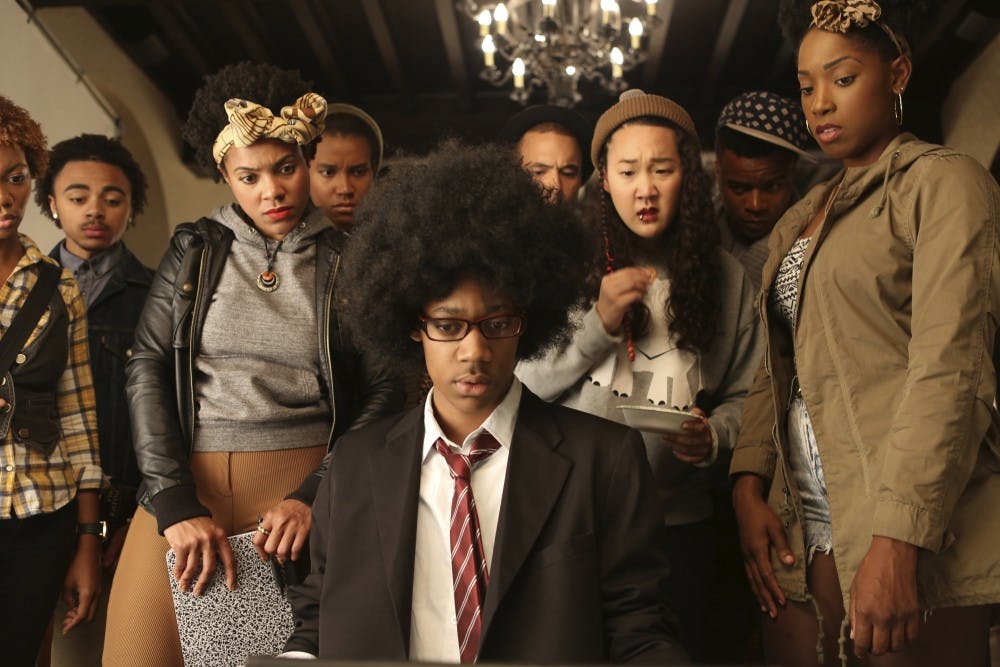Writer, director and producer Justin Simien burst onto the scene with the new satirical film “Dear White People,” which explores race in America through the lens of satire. The Eagle’s Brianna Williams sat down with Simien to discuss the film. After you read the interview, check out Williams’ review of the film.
Eagle: Where did the idea of “Dear White People” come from?
Justin Simien: It really started in my college experiences, sort of having conversations among other black people that were not only amusing and interesting and poignant but about being a black person at a mostly white college, that I found strangely absent from movies. And other versions of the black experience that we were all watching and tuning into. That combined with a sort of love for the Black Smart House; “Do the Right Thing” and the success that movie began. These interesting and spirited portrayals of black people and conversations about black life that were just totally absent from the movies by the mid-2000s when I started writing the film. So it was really a combination of those two motivations that sparked the idea.
E: You decided to tackle race relations and issues dealing with the black community in a satirical way as opposed to a more “serious” approach, why did you take that approach?
JS: I think part of it was subconscious. I never saw the movie as anything but a comedy. Now I wouldn’t even call it a comedy, I would call it a satire. But the first draft of it was completely comedic; it was broadly comedic. And then as I got older and saw more of the world, I got a taste of what it was like being a black face in a white place. This was the real world, not just college. That’s when the movie really took the form of satire. I thought, ‘Okay, if I’m going to make people laugh, I more so want to say something.’ I never really considered a version of the movie that took itself all the way seriously that was some sort of earnest dramatic version of events because we kind of have that already. We already had the sort of tragic portrayal of black people. We already had the racism biopics. That was something that I was kind of over. It’s never occurred to me to do it in any other way.
E: You tackled a lot of the stereotypical black characters in a way that is not typical of the way we see in Tyler Perry movies or similar films. What was your inspiration behind the black characters?
JS: All of them are, in my head, meant to sort of be a skew of what you typically see. So you have, Sam, who in a different movie would be labeled as the angry black chick and she even talks about that herself. But I wanted to peel that away and show a complicated, interesting person. You have the queer character of color, who is often painted in extreme colors in most movies and I wanted to show a real human being under that. I wanted to tackle this idea of identity from different points of view and to really show the more common type of way I, as a black person, saw and my self-pride sort of get along in society, to use my identity to my advantage in order to reach my potential. That’s really where they all came from.
E: Do you think this movie will help people get a better sense of the black community?
JS: I think what I want is for people to leave the theater with a better sense of themselves. I love when people come into the movies and see themselves in characters that they didn’t expect to. It’s fun to see white people identify with the black characters, and its fun to see black people who come into the film thinking they’re Coco and realize that they’re Sam or come to the film thinking they’re Troy and realize that they’re Lionel. That is the best part because the movie tends to hold a mirror up. Personally, my favorite conversations in the lobby after I see a film are ones where I can’t quite be the same person after I saw the film. My vision of the American dream is somehow changed because of the film I just saw and that’s what I want people to leave with is thinking about themselves and the choices they make and the personas they play out in the world in a way that maybe they didn’t before they saw the film.
E: What is the message you hope black people take away from the movie?
JS: When we go to see the movies and it’s an all-white cast the movie is obviously meant to represent all of us, we’re meant to see ourselves in the characters no matter what color they are, that’s not the way black films are seen. That’s something that needs to change and I think little by little as audiences discover the film, I can make an impact there. And also for black people to see themselves like everyone but also to have the experience of seeing a complicated vision of their lives on screen which unfortunately is not always afforded to us. Sometimes when we see a black character in a movie it’s embarrassing and it’s a stereotype; it just has nothing to do with us. The experience of seeing ourselves in the culture is a powerful, powerful experience. Seeing ourselves painted as complicated human beings with complicated motivations, it makes us feel human. It reflects back our humanity. That’s something we don’t get enough of unfortunately.
“Dear White People” (R, 100 min) is now playing at AMC Georgetown and Regal Gallery Place.





